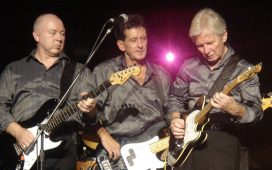Saturday night on the banks of the Ohio River, and the most American of scenes is unfolding. At the Ball Park, the Cincinnati Reds are playing the Texas Rangers, while at the US Bank Arena next door Carrie Underwood is making the latest stop on her global tour. Fans spill together through the muggy streets, a mingling of scarlet baseball jerseys and tan cowboy boots.
This is Underwood’s first tour since 2016, a huge two-hour, 60-date monolith of a show in support of last year’s album Cry Pretty. Reaching UK arenas on Friday, it features a hydraulic stage, multiple costume changes and fearsome pyrotechnics, and it will carry her from Greensboro, North Carolina, to Detroit, Michigan, via the Glastonbury festival this weekend.
The most successful winner of American Idol, triumphing in the TV talent show’s fourth season in 2005, Underwood has since recorded six albums, sold over 65m records, won seven Grammys, and earned more than $83m (£65m). She is beautiful and blonde, and married to a retired ice hockey player: at first glance an unlikely addition to the Worthy Farm lineup.

When we meet backstage after the show she is out of her costume but still in her stage makeup – teary glitter circles smudged beneath her eyes. “I got us wine!” she announces from the sofa, pouring a large glass of cabernet sauvignon. “This is actually a treat for me because normally I go straight to my bus, and I have a crying baby.” Underwood’s second son, Jacob, was born in January, and now he, her four-year-old, Isaiah, and her husband, Mike Fisher, have joined her on tour. “I actually kicked my husband out of the bed and he sleeps on the couch up front,” she says of their onboard sleeping arrangements. “It’s just a lot easier to wake up in a moving bus and grab the baby and feed him.” She says she has puzzled over how to adapt her set for Glastonbury, deciding to largely play the hits, “try to keep it eclectic” and perhaps bust out an Aerosmith cover.
It must be a strange time for such a quintessentially American artist to be visiting the wider world, especially one who is white, southern and religious. “I feel like more people try to pin me places politically,” she says carefully. “I try to stay far out of politics if possible, at least in public, because nobody wins. It’s crazy. Everybody tries to sum everything up and put a bow on it, like it’s black and white. And it’s not like that.”
She cites as an example the reaction to her recent single The Bullet, which looked at the long-running emotional impact of a shooting death. “Immediately people said ‘Oh you have a song about gun control!’” she sighs. “It was more about the lives that were changed by something terrible happening. And it does kind of bug me when people take a song, or take something I said and try to pigeonhole or force me to pick a side or something. It’s a discussion – a long discussion.”
She grew up in small-town Oklahoma, where like most families they kept guns under the bed. “We had one stop light, one school,” she recalls. “Choir, band, football, basketball and baseball.” Her parents, a teacher and paper-mill worker, drove her to other small towns in a homemade costume to compete in talent shows. “The savings bond I would win wouldn’t cover whatever we spent on gas to get there,” she remembers.

When she was 15, she landed a development deal with a record company and got to record in Nashville, though it came to nothing. “I just got my braces off, my acne had cleared up decently … but we had no idea what we were doing,” she says of herself and her band. She went to college to study communications, joined a theatre group and found for the first time in her life a feeling that “this is a safe place, we can sing and it’s OK here”. Apart from the out-of-town talent shows, she had largely kept her voice to herself. “I was more guarded with singing anywhere near where I grew up,” she explains. “It’s that fear thing: what will ‘they’ say? What if ‘they’ laugh at me?”
In 2005 she used her parents’ dial-up internet to register for American Idol. “I thought: why not?” she explains. “Because then I figured at least the door will be shut and I could stop wondering. I could stop thinking ‘what if?’ And then I could just come home, and graduate and get a job.”

I wonder whether, performing before thousands of people in vast arenas, she still worries about what ‘they’ might think when she’s singing. “A lot of times I feel like I’m alone,” she says. “I’m obviously aware of people being around me. But it’s like I’m in the song alone on stage.” It is a good place. “I like to be alone. My husband is probably the only person this planet I could’ve married – my mom, when I told her I was engaged, was even like ‘I just never really thought you’d get married.’ And so I feel like when I’m alone and singing and I hear nothing but music, it’s a nice place to be.”
A recent study found that lately country music has moved away from its familiar subjects of hardship and heartbreak towards party songs. “There’s a lot of songs that aren’t actually saying too much,” she says. “Fun songs to listen along to; party vibe.” She pauses. “It makes my skin crawl when I hear somebody say ‘Gurrrl’ in a song, you know?”
Underwood prefers the traditional themes: the woman wronged, the sorrow worn. She will stand looking immaculate in a pretty frock, singing about hard times, being cheated on, drinking, messing up her unfaithful’s car. “I hope people know you gotta have a little crazy in ya!” she laughs. “I’ve got long blond hair and I like glitter … But there’s a little crazy in there, and I like that to come out every once in a while. I went through a phase where I killed a lot of people” – she mentions the Blown Away album in which the body count included Cupid hunted down with a shotgun and an alcoholic father taken out by a tornado. “I have no idea why, but I wanted everything to be cinematic and dramatic. This album, things were a little more on the emotional side.”
Last autumn, as she launched Cry Pretty, she spoke openly of the experience of suffering three miscarriages in the course of two years, and how that loss coloured many of the new songs, capturing the time when “I was still trying to do my job and put on a smiley happy face and be Carrie Underwood. And then I’d go home and fall apart.”
The response to her speaking openly about miscarriage has been deeply moving. “It’s something that people don’t really talk about,” she says. “Even people who are my friends and I know well, after I talked about it were like, ‘My gosh, me too!’ And I feel like it’s something I should’ve known about them.”
She takes a moment. “I think you feel silly being so attached to something that you knew about for this long,” she says, and holds up her fingers a short distance apart. “But I still feel it, you know. I mean it took me a while to be able to sing certain songs and be able to get through them without really going there. It doesn’t go away. Ever.”
Today she finds singing songs such as Cry Pretty and Low “difficult” but “therapeutic”. “I guess you wait for things to stop hurting at some point,” she says gently. “But letting yourself go there … other people that are going through the same thing, it kind of connects you to them. I will always mourn those children, those lives that were a shooting star, a breath of smoke, but I have Jacob, and he is incredible, he is the sweetest little baby. At the time it was awful, and it still hurts, but it’s kind of like OK, I have this.”

Underwood’s producer, David Garcia, says the number one question she gets asked is whether or not she genuinely writes songs, “or does she just show up and Instagram the whole time?” Underwood not only writes, she also co-produced this record — an anomaly in the male-dominated world of country music. “I mean, I get it: if you were a songwriter in Nashville, and 90-plus per cent of artists are male, are you going to go into your writing session and write a song for a woman?”
She looks resolute. “It doesn’t bother me,” she says. “I’ll do it myself.” She pours one last glass before she heads to the bus and the crying baby. “But we do it all. In high heels. I’ll be waking up at God knows what time in the morning feeding my baby – no one else can do that, and I’m proud of that.”













